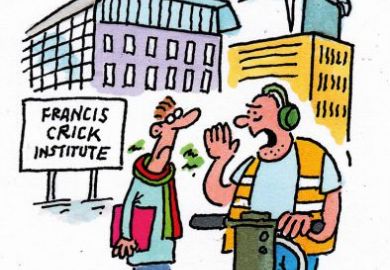
A master’s degree in dramatic writing at a UK university was at the centre of a drama of its own making when it was forced to refund the tuition fees paid by all of its first-year students, The Times reported on 11 December. Central St Martins, part of the University of the Arts London, paid £5,000 to each of the course’s 23 first-year students, and partially refunded the fees paid by most second-years, after the programme fell short of expectations. Students had been told that they would be tutored by “industry masters”, but many never showed up, according to the newspaper, which said that classes were often cancelled, sometimes with less than an hour’s notice. It also emerged that CSM required students taking the refund to sign a contract allowing the institution to recoup the money if they made the agreement public. In a statement, CSM acknowledged that last year’s course had fallen short of standards and that “we therefore reimbursed students on the course up to the full amount of their fee”.
Jo Johnson has had plenty to contend with in recent months as universities have come under fire from all quarters but he faced possibly his toughest challenge yet when he was asked to play a schoolboy at chess – and lost. The UK’s universities minister, MP for Orpington in Kent, battled for 45 minutes against the secondary school pupil during a visit to a chess club in his constituency, This is Local London reported. During the visit, Mr Johnson also presented an engraved plate to an eight-year-old player who recently competed for England at the European Youth Chess Championships. Shlok Verma got the second highest score by an England player in the under-eight section of the championships, according to the website. Perhaps sensibly, Mr Johnson did not take him on for a game.
After unsuccessful spells at Manchester United, Real Sociedad and Sunderland, David Moyes’ stock as a football manager is not high. This didn’t deter the University of Central Lancashire, however, which awarded the Scot with an honorary fellowship last week. To be fair, the university was honouring his achievements with local side Preston North End, where Mr Moyes made 172 appearances as a player and led the team to the brink of the Premier League as a manager. However, the chances of any of Manchester’s universities honouring Mr Moyes any time soon seem pretty slim.
With students facing a constant battle against astronomical living costs, they may be forgiven for taking any freebie on offer. Hopefully, that is how those running the University of Glasgow will see it after students managed to get free coffee worth about £1,600 from a faulty vending machine on campus. According to The Herald, a problem with the library-based machine meant it dispensed a drink after entering the code “1234”. It is thought that students passed the news among themselves for about a week before engineers were brought it in to fix the error. A university spokeswoman told the newspaper that they would not be calling in the police over the matter.
Forget spurious claims plastered across the side of a campaign bus, it seems that disappearing election posters are what you really need to get a rerun of a vote. That is what has happened at the University of Aberdeen, where the election for the next rector has been mired in controversy after accusations that posters of some of the candidates were removed. The Herald reported that it has been alleged that supporters of the sitting candidate – Scottish Greens co-convenor Maggie Chapman – had been involved. But her team has strenuously denied the claims, saying that there was no evidence to back them up, and that it smacked of opponents trying to get the result annulled. Either way there will be a new vote in the New Year, when hopefully the matter will be settled. Brexit, on the other hand…
On the subject of Brexit, there was some good news for universities at last when the proposed agreement between the UK and the European Union brought confirmation that British participation in programmes funded under the EU’s research framework were set to be supported until 2020. In a joint report on phase one negotiations, EU and UK government officials also confirmed that academics from the EU are expected to retain the right to UK residency after Brexit, even after spending up to five years abroad for work. Academics may welcome any sign of a softer Brexit – but would undoubtedly still prefer no Brexit at all.
Register to continue
Why register?
- Registration is free and only takes a moment
- Once registered, you can read 3 articles a month
- Sign up for our newsletter
Subscribe
Or subscribe for unlimited access to:
- Unlimited access to news, views, insights & reviews
- Digital editions
- Digital access to THE’s university and college rankings analysis
Already registered or a current subscriber?



